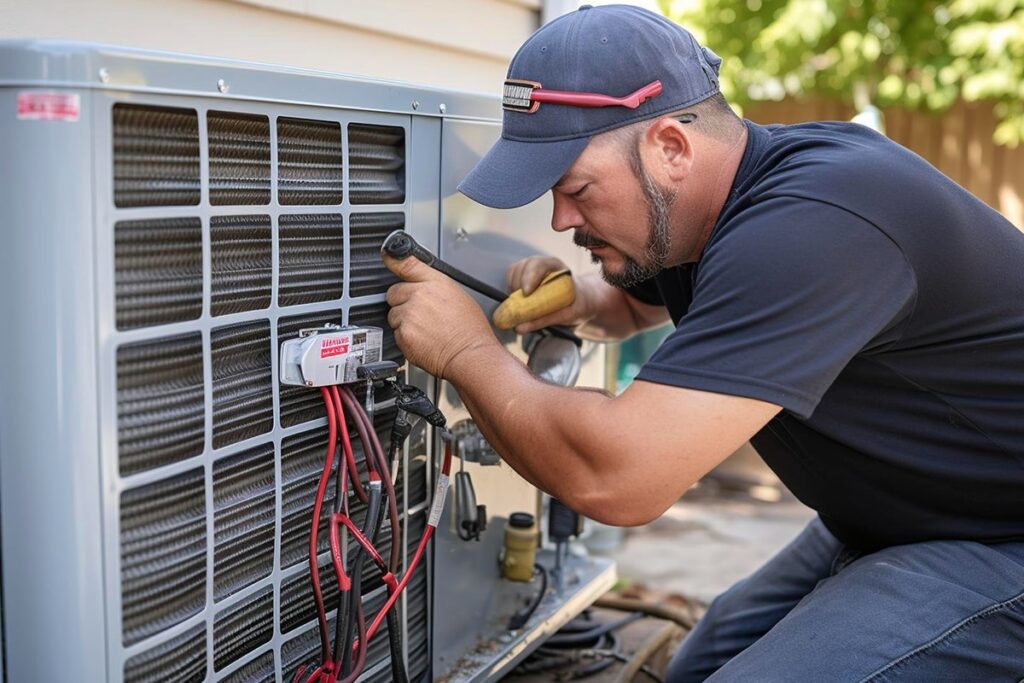Introduction
Your HVAC system is essential for keeping your home comfortable throughout the year. Like any complex system, it can run into various issues that affect its performance. We put a lot of work into creating an article that will help you understand your air condition system. We’ll discuss common HVAC problems, including issues with the filter drier, ECM motors, and managing sensible and latent heat. Understanding these problems can help you maintain your HVAC system more effectively and avoid costly repairs.

Filter Drier Problems
What is a Filter Drier?
A filter drier removes moisture and contaminants from the refrigerant in your HVAC system. The refrigerant circulates through the system, absorbing heat from inside your home and releasing it outside. Moisture in the refrigerant can form acids that corrode the system from the inside, causing serious issues.
How Does a Filter Drier Work?
The filter drier contains a desiccant, a material that absorbs moisture. As the refrigerant passes through the filter drier, the desiccant removes any moisture present. Additionally, the filter traps dirt and other particles, preventing them from circulating through the system and causing damage.
Signs of a Faulty Filter Drier
- Reduced Cooling Efficiency: If your HVAC system isn’t cooling properly, it could be due to a clogged or malfunctioning filter drier.
- Frost on the Evaporator Coils: Moisture in the refrigerant can freeze, indicating that the filter drier isn’t removing enough moisture.
- Increased Energy Bills: A faulty filter drier can cause the HVAC system to work harder to achieve the desired temperature, leading to higher energy consumption.
Importance of a High Filter Drier
Modern HVAC systems operate at higher pressures for better efficiency. The high filter drier is designed to handle these conditions, ensuring that the refrigerant remains clean and moisture-free even at high pressures. Regular maintenance and timely replacement of the filter drier can extend the life of your HVAC system and keep it running efficiently.
ECM Motors in HVAC Systems
What is an ECM Motor?
ECM stands for Electronically Commutated Motor. These motors are known for their energy efficiency and ability to adjust their speed based on the system’s needs. Unlike traditional motors that run at a constant speed, ECM motors can slow down or speed up as required, providing more precise control over the HVAC system.
How Do ECM Motors Work?
ECM motors use a combination of electronic controls and permanent magnets to adjust their speed. This allows them to operate more efficiently than traditional motors, which use a fixed speed and consume more energy.
Common Issues with ECM Motors
- Electrical Failures: Problems with the electronic controls can affect the motor’s ability to adjust its speed.
- Overheating: Poor ventilation or excessive dust can cause the motor to overheat, leading to potential damage.
- Wear and Tear: Over time, even the most durable motors can experience wear and tear, affecting their performance.
Benefits of ECM Motors
- Energy Efficiency: ECM motors use less electricity, which can reduce your energy bills.
- Variable Speed: They provide better temperature control by adjusting their speed, ensuring a more consistent and comfortable indoor environment.
- Quiet Operation: ECM motors operate more quietly than traditional motors, enhancing home comfort.
- Durability: ECM motors typically have a longer lifespan due to their efficient design and reduced wear and tear.
Sensible Heat vs. Latent Heat Management
Understanding Sensible Heat
Sensible heat refers to the heat that changes the temperature of the air without changing its state. For example, when you heat air, its temperature rises, but it remains air. Sensible heat is the type of heat you can feel and measure with a thermometer. In HVAC systems, managing sensible heat is essential for maintaining the desired air temperature in your home.
Understanding Latent Heat
Latent heat is the heat absorbed or released during a phase change of a substance, such as when water evaporates to become steam. This type of heat does not affect the temperature but changes the state of the substance. In HVAC systems, latent heat is managed to control humidity levels.
How HVAC Systems Manage Heat
- Sensible Heat Management: The HVAC system controls sensible heat by heating or cooling the air to maintain the desired temperature. This involves using components like the compressor, condenser, and evaporator to transfer heat in and out of the home.
- Latent Heat Management: Managing latent heat involves controlling the humidity levels in your home. The HVAC system removes moisture from the air during the cooling process, which helps to maintain a comfortable indoor environment.
Common Problems with Heat Management
- Improper Sensible Heat Management: If your HVAC system isn’t properly managing sensible heat, you might find that your home isn’t as warm or cool as you’d like. This can be due to issues like a malfunctioning thermostat, inadequate insulation, or a problem with the HVAC components.
- Poor Latent Heat Management: High humidity levels can make your home feel sticky or clammy even if the temperature is correct. This can occur if the HVAC system isn’t effectively removing moisture from the air.
Importance of Proper Heat Management
Both types of heat management are crucial for a comfortable living environment. Sensible heat keeps the temperature right, while latent heat control ensures the humidity is comfortable. Proper heat management can also improve energy efficiency, reduce wear and tear on the HVAC system, and enhance overall home comfort.
Regular Maintenance Tips
Schedule Regular Inspections
One of the best ways to prevent HVAC problems is to schedule regular inspections with a professional technician. During these inspections, the technician can check for any potential issues and perform routine maintenance tasks like cleaning the filter drier, inspecting the ECM motors, and ensuring proper heat management.
Change Filters Regularly
Dirty or clogged filters can reduce the efficiency of your HVAC system and lead to a range of problems. Make sure to change your filters regularly, according to the manufacturer’s recommendations. This simple task can significantly improve the performance of your HVAC system.
Keep the Area Around Your HVAC Unit Clean
Dust, dirt, and debris can accumulate around your HVAC unit and cause various issues, including overheating and reduced efficiency. Keep the area around your HVAC unit clean and free of obstructions to ensure proper airflow and operation.
Monitor Energy Bills
An unexpected increase in your energy bills can be a sign that something is wrong with your HVAC system. If you notice a spike in your energy costs, it’s a good idea to have your system inspected to identify and address any issues.
Listen for Unusual Noises
Strange noises coming from your HVAC system can indicate a problem with the components, such as the ECM motors or filter drier. If you hear any unusual sounds, contact a professional technician to diagnose and fix the issue.
DIY Maintenance Tips
While professional maintenance is crucial, there are some simple tasks you can do yourself to keep your HVAC system running smoothly:
- Check Thermostat Settings: Ensure your thermostat is set correctly and is functioning properly.
- Inspect Ductwork: Look for any visible leaks or blockages in your ductwork and seal them as needed.
- Clear Debris from Outdoor Units: Make sure there are no leaves, grass, or other debris blocking your outdoor unit.
Seasonal Maintenance
Spring Maintenance
- Check Refrigerant Levels: Ensure your system has the correct amount of refrigerant.
- Clean Coils and Fins: Remove dirt and debris from the coils and fins to improve efficiency.
- Inspect Electrical Connections: Check for any loose or corroded electrical connections.
Fall Maintenance
- Inspect the Heat Exchanger: Look for cracks or damage in the heat exchanger.
- Check for Gas Leaks: Ensure there are no gas leaks in your heating system.
- Test the Ignition System: Make sure the ignition system is working properly.
Professional Maintenance
Even with regular DIY maintenance, it’s essential to have a professional technician inspect and service your HVAC system at least once a year. They can perform more thorough checks and maintenance tasks, including:
- Testing System Controls: Ensure the system starts, operates, and shuts off correctly.
- Lubricating Moving Parts: Reduce friction and wear on moving parts.
- Calibrating the Thermostat: Make sure the thermostat is accurate.
Conclusion
Understanding common problems in your HVAC system and knowing how to address them helps keep your home comfortable and avoid costly repairs. Regular maintenance and timely repairs are key to keeping your HVAC system running efficiently. If you’re experiencing any of these issues or need professional advice, contact Mullins Heating and Cooling. Our experts are here to help ensure your HVAC system performs at its best.
For more information on maintaining your HVAC system or to schedule a service, reach out to Mullins Heating and Cooling today!
Contact Information
- Phone: (205) 647-8575
- Website: Mullins Heating and Cooling
- Service Areas: Warrior, AL; Gardendale, AL; Fultondale, AL
Additional Resources
By following these tips and keeping up with regular maintenance, you can ensure your HVAC system runs efficiently and lasts longer. Trust Mullins Heating and Air for all your HVAC needs.







